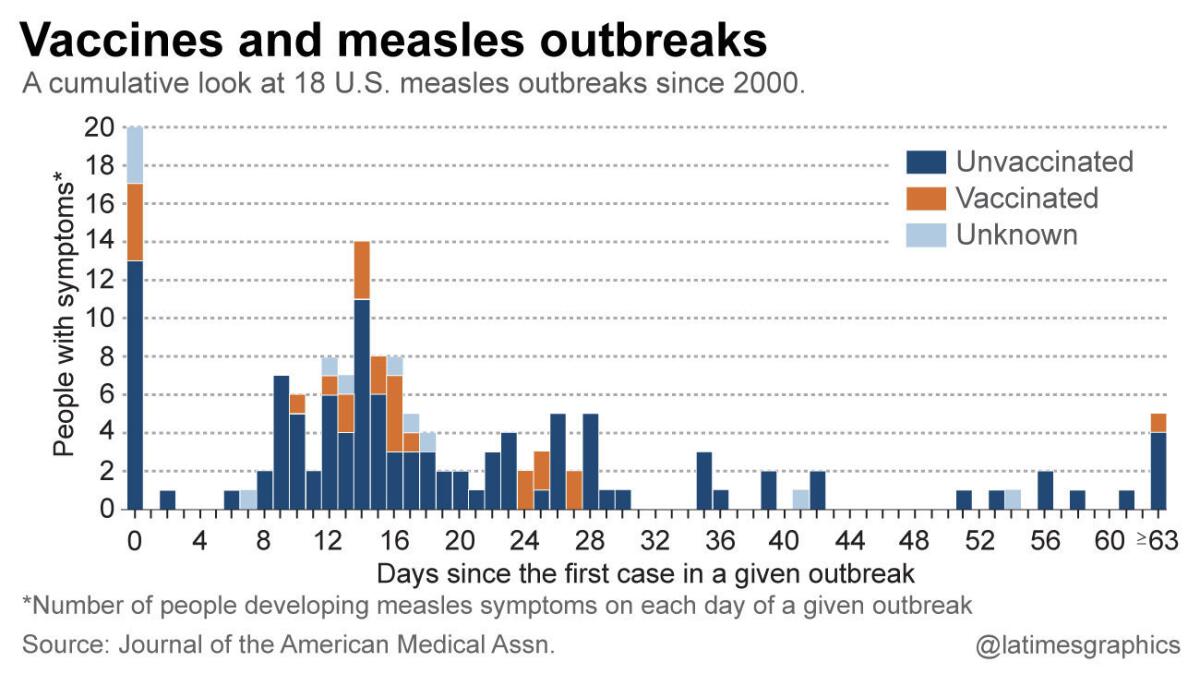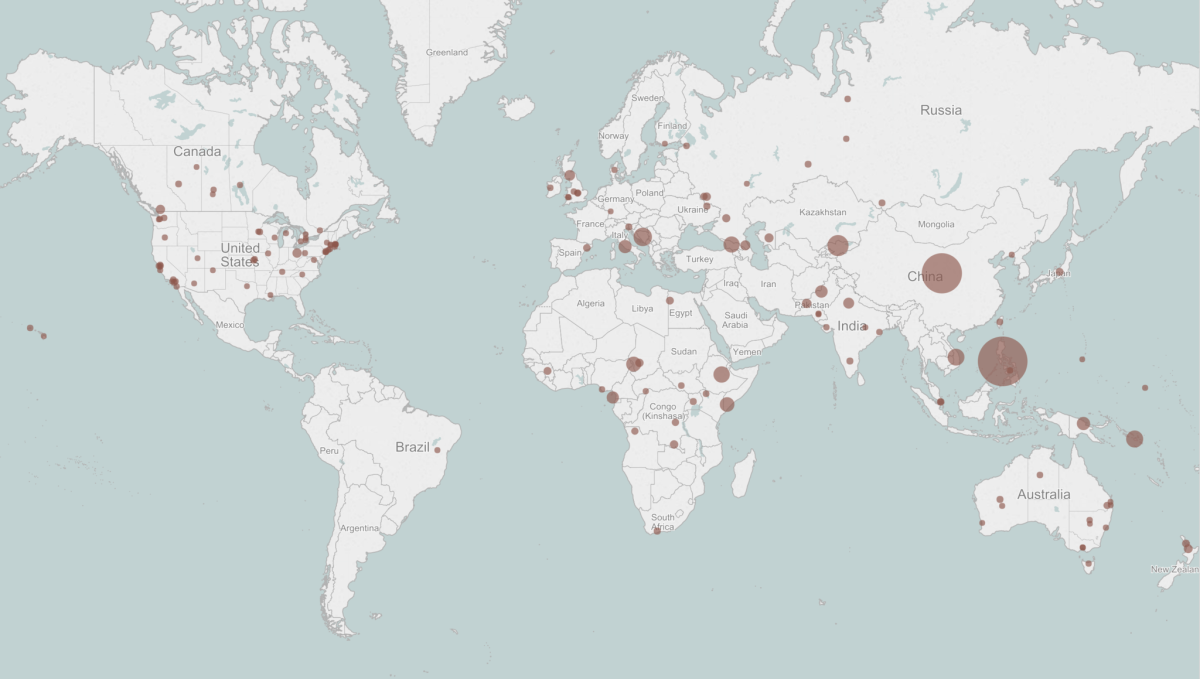Column: How Robert De Niro’s Tribeca Film Festival sold out to anti-vaccine crackpots [UPDATE]
The damage done to public health by the British ex-physician Andrew Wakefield, who was stripped of his license for falsifying a study linking the MMR vaccine (for measles, mumps and rubella) to autism, has been incalculable. Wakefield's claims have been conclusively discredited everywhere but in the fever swamp of the anti-vaccine movement -- and now in the glamorous environment of the Tribeca Film Festival.
The festival, which was co-founded by Robert De Niro in 2002, has placed a film purporting to defend Wakefield and accusing the Centers for Disease Control and Prevention of a cover-up on its program this spring. The film is called "Vaxxed: From Cover-Up to Conspiracy." Its director: Andrew Wakefield.
[UPDATE 2: TheTribeca Film Festival has canceled its showing of Andrew Wakefield's documentary "Vaxxed," following widespread condemnation of its plans. In an emailed statement, Robert De Niro, the festival's co-founder, said: "My intent in screening this film was to provide an opportunity for conversation around an issue that is deeply personal to me and my family. But after reviewing it over the past few days with the Tribeca Film Festival team and others from the scientific community, we do not believe it contributes to or furthers the discussion I had hoped for." De Niro, who earlier acknowledged that he was responsible for placing the film on the festival schedule and defended it for contributing to a "discussion" of the purported link between the MMR vaccine and autism, now says "we have concerns with certain things in this film that we feel prevent us from presenting it in the Festival program."
As my colleague Steven Zeitchik reports, the festival's publicity for this film endorses its conclusion that "vaccines do cause autism" and treats the controversy in pure Hollywood style: "The most vitriolic debate in medical history takes a dramatic turn when senior-scientist-turned-whistleblower Dr. William Thompson of the Centers for Disease Control turns over secret documents, data and internal emails confirming what millions of devastated parents and 'discredited' doctors have long-suspected." You would think it's the second coming of "The China Syndrome."
How on earth did this documentary full of antivaccine lies ... get into Tribeca?
— David "Orac" Gorski, pseudoscience debunker
But it's nothing of the kind. Wakefield's work, and the "conspiracy" theory of Thompson, have been thoroughly debunked.
Let's be absolutely plain about this: There is absolutely no evidence of any link between the MMR vaccine and autism. In a 2014 survey of scientific studies covering 1.26 million children, researchers stated bluntly that "vaccinations are not associated with the development of autism or autism spectrum disorder. Furthermore, the components of the vaccines (thimerosal or mercury) or multiple vaccines (MMR) are not associated with the development of autism or autism spectrum disorder." That's just one example of the many studies finding no link. Thimerosal is a mercury-based preservative that was used until 1999 in the MMR vaccine.
Here's the background on Wakefield, the Thompson "whistleblowing" case, and the consequences of anti-vaccine pseudoscience.
Oncologist and scientific watchdog David H. Gorski, who blogs under the nom de plume "Orac" and has been following the Wakefield and Thomson sagas for years, raises the pertinent question: "How on earth did this documentary full of antivaccine lies ... get into Tribeca?" (See the accompanying trailer.)
The answer may have much to do with Hollywood's taste for anything that promotes drama and controversy, no matter how irresponsible. "Tribeca, as most film festivals, are about dialogue and discussion," a Tribeca spokesman told Zeitchik. "Over the years we have presented many films from opposing sides of an issue. We are a forum, not a judge." As Zeitchik observes, documentaries on controversial topics aren't unknown to the film festival circuit -- Sundance, for instance, gave exposure to Gabriela Cowperthwaite's “Blackfish,” about animal abuse at Sea World, and to Davis Guggenheim’s “Waiting for Superman,” about public education in the United States. But they were independent filmmakers; not directors making movies about themselves.
[UPDATE: De Niro on Friday issued a statement defending the screening of "Vaxxed." He said, “Grace and I have a child with autism and we believe it is critical that all of the issues surrounding the causes of autism be openly discussed and examined. In the 15 years since the Tribeca Film Festival was founded, I have never asked for a film to be screened or gotten involved in the programming. However this is very personal to me and my family and I want there to be a discussion, which is why we will be screening VAXXED. I am not personally endorsing the film, nor am I anti-vaccination; I am only providing the opportunity for a conversation around the issue.” Grace Hightower is De Niro's wife.
[Deconstructed, the statement seems to indicate that De Niro wants to have things both ways. He says he's not "anti-vaccination," but to assert that examining "all of the issues surrounding the causes of autism" requires giving a platform to the most notorious and discredited critic of vaccination in the autism community, Andrew Wakefield, is tantamount to taking an anti-vaccination stand. De Niro, like the anti-vaccination camp, treats the supposed link between the MMR vaccine and autism as an issue still under discussion. In the scientific and medical communities, it's not; extensive studies have established no link, whatsoever.]
That hand-waving in favor of "dialogue" can shield a lot of damaging mischief. It's the same sentiment that was behind Katie Couric's decision to give equally irresponsible conspiracy-mongers about HPV vaccines a platform on her syndicated daytime show in 2013, exposing their science-free viewpoints to millions of viewers. Couric soon acknowledged her misstep, recognizing that children's health and even lives are at stake when parents are encouraged to doubt the efficacy and safety of vaccines. (We're not even talking about starlet Jenny McCarthy, whose claims about the links between the MMR vaccine and autism are merely ignorant.) This trend to casual, uninformed skepticism about common vaccines underlies the surge in measles cases in recent years, as is shown by the chart below.

Wakefield's contribution to the anti-vaccine movement began in 1998, when he published a paper in the distinguished British medical journal the Lancet purporting to find links between the MMR vaccine and developmental disabilities in 11 children. Wakefield was later found to have committed "serious professional misconduct" in connection with the study and other activities by British medical licensing authorities, who labeled him "dishonest," "unethical," and "callous" and stripped him of his license in 2010. The Lancet retracted the paper that year. Wakefield relocated to Texas, where despite being discredited, he was lionized as a hero of the anti-vaccination movement.
----------
RELATED READING:
The toll of the anti-vaccination movement, in one devastating graphic
Katie Couric puts the anti-vaccination movement into the mainstream
Jenny McCarthy: Anti-vaxxer, public menace
----------
Then came the Thompson affair, which Gorski calls "the central conspiracy theory of the antivaccine movement." Thompson, a CDC researcher, was co-author of a 2004 study that, like every scientifically rigorous study in the field, found "no significant associations" between the MMR vaccine and autism. In 2014, the data used in the paper was "reanalyzed" by an anti-vaccine crusader named Brian Hooker. After torturing the data at length using statistical techniques that have been widely questioned, Hooker claimed to have discovered a correlation between the vaccine and autism in African American boys in the study group, but no other sub-group. Hooker's paper was picked apart by experts, and was retracted by its journal four months after its publication.
Hooker meanwhile reached Thompson, who said during a lengthy series of taped conversations that he thought some data that should have been published was left out of the report. Thompson has since been labeled a "whistleblower," but whether he's actually accusing his colleagues or the CDC of fraud, as the anti-vaccine lobby clams, hasn't been very clear. In a 2014 public statement, Thompson said "statistically significant information" was omitted from the 2004 paper, but he says he's in favor of vaccinating everyone, that "reasonable scientists can and do differ in their interpretation of information," and that he was not "aware that [Hooker] was recording any of our conversations, nor was I given any choice regarding whether my name would be made public or my voice would be put on the Internet." Interestingly, while Hooker appears in the trailer for Wakefield's movie, Thompson does not, except via a recording of his voice.

The phenomenon that Wakefield kicked off in 1998 continues to reverberate worldwide, but especially in Britain and the United States, where anti-vaccine sentiment suppressed measles vaccinations for more than a decade. Among the consequences are measles outbreaks in first-world countries where the disease should long ago have been eradicated. The accompanying map, from the Council on Foreign Relations, shows the toll in 2014; an interactive version, which can display cases of measles and other vaccine-preventable diseases from 2008-2015, can be found here.
Careless actions such as those of the Tribeca Film Festival don't contribute to "dialogue and discussion," as the festival's PR would have it; they just spread misinformation and pseudoscience and undermine public health. No one would say that Wakefield's film should be suppressed. But the question is whether it deserves to be shown under the imprimatur of a respected cultural institution -- or if that institution, the Tribeca festival, is sullying its own reputation by giving Wakefield a platform.
Keep up to date with Michael Hiltzik. Follow @hiltzikm on Twitter, see his Facebook page, or email michael.hiltzik@latimes.com.
Return to Michael Hiltzik's blog.
UPDATES:
1:57 p.m., Mar. 25: This post has been updated with a statement by Robert De Niro.
5:13 p.m., Mar. 26: This post has been updated with Tribeca's decision to cancel the showing of "Vaxxed."
